- Home
- Gareth L. Powell
Fleet of Knives Page 15
Fleet of Knives Read online
Page 15
CHAPTER THIRTY-TWO
NOD
“Nod, come to the infirmary,” they say.
Big hurry.
Down tools and climb stairs.
Leave offspring to work.
Always work.
Always more to fix.
Arrive at infirmary to find injured Druff.
“Help me fix it,” Preston says.
But one look enough to see Druff cannot be fixed.
Druff broken inside.
Has entered dying drowse. Preparing to rejoin World Tree. Root of all things.
Curled up like a seed.
“Cannot fix,” I say. “Much apologies.”
“I don’t think I can do it without you.”
Preston only has one face.
Only two hands.
Humans next to useless.
“Can you at least speak to it?” he asks.
I shrug three shoulders.
“Rude to interrupt dying drowse.”
“But it can be done?”
“Only in emergency.”
Preston wipes face with hands. Peculiar action.
“This is an emergency.” He talks slowly. “We don’t know what happened to that ship, and half the crew’s still missing. Anything it can tell us would be a big help, you know?”
Think of offspring in engine room.
Much fixing.
Much mischief.
Need to get back before totally rewire Troublesome Hound.
“With reluctance,” I say.
Place two faces against brother Druff.
Scent tells me name is Chet.
Chet from high in the Windward Branches of World Tree.
Traveller and engineer.
No current life partner.
Must push beyond scent.
Press faces hard against side. Speak name. Push tongue beneath scales to jab skin.
Chet wakes. A single face emerges. Draws ragged breath.
“Where is crew, Chet?”
“Crew gone.”
Fingers hang limp around edge of face.
“Where gone?”
“Nymtoq grave ship.”
“How many?”
“Let me sleep, Nod.”
“Humans need to know. How many?”
“Five, maybe six. Not sure who survived crash. Know two for definite.”
“Thank you, Chet.”
“Work done? Rest now?”
“Rest.”
Chet’s head droops. Eyes burn like black stars.
“Nod. Important.” Breath failing. “Tell others. White ships are cousins.”
“Not understanding.”
Chet drowning in internal fluid.
“Tell them.”
I curl fingers over Chet’s spine. Feel shudder.
Then silence.
No more breathing. No heartbeat.
No nothing.
Chet gone to World Tree.
“Store body,” I tell Preston. “One day, deliver Chet home.”
Feed him to World Tree’s roots.
Reunite with ancestors.
Be one with Tree.
CHAPTER THIRTY-THREE
ONA SUDAK
As the white ships cleaved the higher dimensions, I slept. It was an old habit left over from the war. In battle, you never knew when the next opportunity for rest might present itself, and so many sailors found it prudent to snatch naps during periods of inactivity.
When I awoke, we were falling back into the universe.
“Have we arrived?”
The bear was where I’d left him, on the podium in the centre of the spherical bridge.
Not yet.
“Where are we?”
The hairy beast brandished a claw at the wall and a three-dimensional star map appeared, with a red line indicating our course from Camrose to the distant point in space where the Trouble Dog had found the lobster-like creature that had my hosts so agitated. About halfway along the line, a small system had been highlighted. Although the notations beside it were in an alien language, I recognised it from its position—coordinates that were forever seared into the very fabric of my soul.
“Pelapatarn.”
That is correct.
Coldness gripped the back of my neck like the touch of a spectral hand. I hadn’t returned to this place since the firebombing.
“Why have you brought me here?” Was it to taunt or punish me? For a weightless moment, I imagined myself marooned on the radioactive, ash-choked surface of the planet, surrounded by the lethal consequences of my actions.
Observe.
The spherical walls disappeared, replaced by a tactical representation of the space surrounding the ship. Distant stars shone like the heads of nails hammered into the body of the sky. Above us, the planet was a diseased eyeball, its surface obscured by cataracts of sickly cloud.
But it wasn’t the planet that held the white ships’ attention. Ahead lay a knot of Conglomeration warships. Two Scimitars and a scattering of Hyenas. They were here to safeguard the system, their presence in this necropolis a symbolic reminder of the final victory that had brought a hard-won armistice to the Generality.
As soon as they detected the three white ships, they came about. But they were already too late. The knife ships cut through them without slowing. Flurries of shard-like projectiles tore into the smaller ships, flensing away their outer skins. And then one of the Scimitars rushed at us. I flinched, expecting a collision, only to find my mouth falling open agog as the white ship’s blade-like prow caught the other vessel amidships and punched a hole right through its hull. I had a momentary impression of wreckage, explosions and internal spaces. Then we were through, accelerating away from the battle.
I turned around, towards the rear of the bridge, and saw the two halves of the sundered Scimitar falling away from each other, trailing cables, furniture and bodies. The other Scimitar had been mortally wounded by projectile fire, and tumbled aimlessly towards the atmosphere. Behind it, the Hyenas had been reduced to clouds of expanding wreckage.
The entire engagement had lasted a little over thirty seconds.
Some of the crew on those ships wouldn’t have had time to realise what had hit them. Some had probably been asleep, hot bunking between watches. Others would have been eating, or tending to other duties around the ship. They may have heard the alarm, but it would have been too late for them to react in any meaningful way. I felt a wave of sympathy. Four years ago, I might have been aboard one of those ships. Hell, I probably knew some of the sailors we’d just killed. And yet, I felt my sympathy tinged with grim satisfaction. I’d destroyed a planet in order to end a war, because I’d believed more lives would be lost if I failed to act. Now, as the Fleet of Knives attempted to stop all future wars, a similar calculation had to be made, and a certain level of losses accepted for the greater good. The crews on the Conglomeration ships had joined the navy in order to keep their home worlds safe. If their deaths ensured a lasting peace, it was their duty to die—whether or not they fully understood the reasons and consequences of their sacrifice—and their bones would serve as the foundations upon which we’d build a safer, better tomorrow.
I had time for one final, defiant look at the curdled mess of Pelapatarn’s mottled, radioactive cloudscape. Then we jumped back into the formlessness of the higher dimensions. Back into the wind and fog between the worlds.
CHAPTER THIRTY-FOUR
JOHNNY SCHULTZ
As soon as we had all reloaded our weapons and taken sips of water from our suits, we began moving further along the maintenance way from the point that had been our overnight refuge. I took the lead. Bernard and Lucy followed, with Dalton helping Santos along behind them. Addison brought up the rear. With the lights off, I had felt threatened by shadows, besieged by the primal fear of being unable to spot a lurking predator. When Lucy turned them on, I had hoped the brightness would make me feel better. Instead, I simply felt exposed and vulnerable—but I guess that’s to be expec
ted when you’re being stalked around an alien derelict by carnivorous monsters. You’re not going to feel comfortable until you’re out of there, whatever the lighting situation. Having a rifle helped, even if it was an antique. At least it gave me something to hold on to, and if worse came to worst, at least I could use it as a club.
I couldn’t begin to imagine how Santos felt. At least I had the option of running from any encounter we might face. With his crushed foot, he was dependent on the rest of us to get him out of trouble. I glanced back, and felt a pang of dismay at the pain evident on his usually cheery face. He had his arm draped over Dalton’s shoulders for support. He wasn’t given to complaining, but I could see how much he hurt by the way his jaw clenched with every awkward step.
“How are you doing, Abe?” I asked.
He looked up at me from beneath bushy eyebrows. “I am fine,” he said. “Just bruising. Let me rest it a little longer, and I’ll be jogging again in no time.”
Beside him, Dalton shook his grey-haired head. “As far as I can tell, your foot’s broken in at least three places,” he said quietly. “You won’t be walking again until you’ve had the bones rebuilt and reset.”
Santos rolled his eyes. “Hah! Find me a stick, and I’ll outrun the lot of you.”
“Do you need to rest?” I asked him.
The smile dropped from his face, and he became serious. “No,” he said. “Not yet.”
“Okay, then.” He could joke around and put on a brave face, but he’d been a spacer long enough to know when his commanding officer needed a straight answer.
When we came to a row of access panels, Dalton said, “If worse comes to worst, we can always unscrew one of these and get into the walls. The crayfish won’t be able to follow us in there.”
I gave the panels a dubious look. No way was I going to abandon my rifle and wedge myself into an electrical duct. The panels were too narrow for us to squeeze through as we were; we’d have to remove our spacesuits and leave most of our gear and weapons outside—assuming there was even enough space behind them for all of us to pack into.
“I’ll bear that in mind. But I think our time would be better spent trying to find some way to communicate with the outside world. When that Reclamation ship shows up, I want to be able to tell it where we are.”
My plan, such as it was, was to keep moving towards the ship’s bows, where Lucy assured us we could gain access to a communications suite. We’d been on this floating hulk for two days. For all I knew, there could be a Reclamation Vessel outside right now. We’d tried calling on our suit radios, but they mostly worked on line-of-sight, and I wasn’t sure they had the power to penetrate the asteroid’s stony crust.
Ahead, the tight passageway gave way to a wider space. I shushed the rest of the crew and inched forwards, eyes and ears straining for any hint of movement or danger.
The cavern beyond stretched away for several hundred metres; its rock walls were black and highly polished, and its roof vaulted like an Old-Earth cathedral. A double row of pillars ran the length of the chamber, but these weren’t any ordinary pillars. Each was smooth, cylindrical and around two metres in width, and they appeared to be made of molten gold, gradually flowing upwards from floor to ceiling.
Lucy was beside me.
“Do you know what these are?”
“Of course, dearie.”
“Do you mind sharing that information with the rest of us?”
“Not at all.” She skipped forwards, walking on her toes like a ballerina. In three quick steps, she’d closed the distance to the nearest pillar, and was reaching out a palm.
“Hey, wait!” I couldn’t help shouting. She was about to press her hand against a column of liquid metal.
She turned and smiled at me. “It’s okay,” she said. “It’s not hot.” She pushed her hand into the stream and her arm sank in to the elbow. The golden fluid rising from the floor flowed around her skin as harmlessly as the honeyed waters of a summer stream.
“Come here,” she said, “and see for yourself.”
Waving at the others to keep back and out of sight, I joined her. And she was right, I could feel no heat radiating from the pillar.
“What is it?”
“The simplest way I can explain it is to say it’s like a kind of computer processor. It used to house and run the digital life traces of a million Nymtoq.”
“Like virtual reality?”
“Yes, but far less crude. This was designed to be a multi-generational voyage. The Nymtoq that were once housed in these columns were members of the ship’s crew who uploaded themselves on their deathbeds. They passed from the physical to the electronic, and stored themselves on this ark, awaiting arrival at the target planet, where they expected to be resurrected in a cloned body.”
“But they’re empty now?”
“The spirits within were evacuated when the Nymtoq rediscovered the ship—long after the final conflict that killed the crew. The salvage team considered it cruel to leave them trapped in a computer simulation for the rest of eternity, so they were moved back to the home world and reincarnated in cloned bodies.”
Tentatively, I reached out. The liquid brushed my fingers, warm as living flesh and soft as syrup.
“This stuff’s a computer?”
“It’s as far beyond what you think of as a computer as a spaceship is to a rowing boat.”
“Interesting.” I could feel my pulse quicken. My mouth felt dry. If I could get a sample of this back to the Generality, I’d be set for life. There were governments and corporations that would pay big money for something this advanced.
I eased my hand deeper, curled my fingers, and pulled out a handful of the stuff. Separated from the main pillar, it stopped flowing upwards, and coalesced into a lustrous golden ball. I held it in my palm, transfixed by its swirling surface.
“Can I take this?”
Lucy glanced at the softly glowing object, and shrugged. “I guess so. It’s not like anybody’s using it right now.”
* * *
We were halfway across the chamber when we heard the clatter of needle-sharp feet against polished rock. The sound was coming from a side tunnel. I couldn’t see up it from where I was, but Addison could.
She waved her arms, motioning us forward.
“Move!”
Bernard started running for the doorway at the far end of the room, galumphing along in his spacesuit. Lucy followed, but Dalton and Santos couldn’t keep pace.
“Let me go,” Santos said. “Give me a gun, and I’ll fight the beast!”
“There’s more than one,” Addison panted.
“Then all the more reason for you to leave me here. I’ve been shelling and cooking bastard crustaceans all my life. I’m not afraid of these oversized crawdads.”
I stepped between them.
“Nobody’s getting left behind.” I’d seen what one of the monsters had done to Kelly; there was no way I could abandon anyone else to such a fate—especially not this courageous, jolly-faced chef in his bulky blue spacesuit. “Now, you two get moving. We’ll hang back and cover you.” The magazine in my rifle was full, which meant I had thirty shots. Ordinarily, that would have seemed plenty for a small skirmish, but up against those metal fiends, it seemed paltry indeed.
The skittering was getting closer. Santos looked me in the eye and gave the barest hint of a nod.
“Gracias,” he said.
I waved him away. “Just go!”
CHAPTER THIRTY-FIVE
TROUBLE DOG
Reviewing the signal logs from Camrose, two things became clear. The first was that the white ships of the alien armada had broken formation and attacked several targets simultaneously. The second was that they’d done so without warning, provocation or mercy. Dispassionately, I listened to the recorded cries and compressed data bursts from ships on the verge of destruction. The ruckus of battle was familiar to me, and I felt little empathy for the casualties. When I’d first learned of the attacks, I’d w
anted to rush to their aid; but now they were dead, I had no compunction to waste time grieving. What good would that do? They were gone; I was not. It was the way of things. I might be learning to care for the ersatz pack I’d acquired—Captain Konstanz, Alva Clay, Preston Menderes, and Nod—but I had no emotion to waste on ships I’d never encountered. They were Conglomeration ships, so obviously I felt faint stirrings of inbuilt loyalty towards them. Of course I did. But they hadn’t been part of my immediate Carnivore pack, so I had no personal stake in the conflict. I had resigned my commission and joined the House of Reclamation. I had killed one of my siblings and severed all ties with the Conglomeration Navy. I had all this hardness within me, and yet still I felt unsettled. I had a suspicion these attacks wouldn’t remain limited to the ships of the Conglomeration Navy. In her message, Ona Sudak had requested all armed vessels to stand down and await further orders from the Fleet of Knives, and I found it unlikely she’d find total compliance among the squabbling factions of the Human Generality, let alone the varied races of the wider Multiplicity. I had told the white ships I wanted to prevent another war. Now they were trying to achieve that objective by destroying everything that might conceivably be used as a weapon. Every armed ship the Armada happened upon.
Including me.
CHAPTER THIRTY-SIX
SAL KONSTANZ
We had a few hours before we drew alongside the Nymtoq ark. Getting there was a slow drag across normal space, but the comparatively short distances involved—only a few hundred thousand kilometres—couldn’t justify the energy expenditure of a hypervoid jump. Instead, the Trouble Dog burned her fusion motors, and her internal gravity generators strained to keep things normal in the crew ring around her waist.
I left the bridge and clambered down to the galley. At the door, I shrugged out of my pressure suit, balled it up, and rolled it into one of the empty quarters across the hallway. The maintenance drones would find it, replenish its stores of air and water, and return it to the airlock closest to my cabin. In the meantime, I had a powerful need for more coffee.
To avoid overheating, I’d taken off my overalls before donning the suit. Stripped of it, I was left in a sports bra and a pair of knee-length black shorts. I could see Preston standing at the counter, but his presence wasn’t enough to deter me. I had my cap on, and that was enough. I marched in there with my bare feet slapping on the deck, the cool air-conditioning caressing the gooseflesh on my belly, and my chin held high. I was too tired to give a damn. This was my ship, after all. If he couldn’t handle the sight of an older woman in spandex and cotton, then that was his problem.

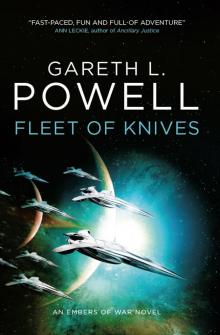 Fleet of Knives
Fleet of Knives Ragged Alice
Ragged Alice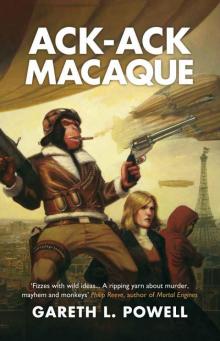 Ack-Ack Macaque
Ack-Ack Macaque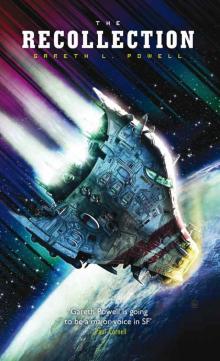 The Recollection
The Recollection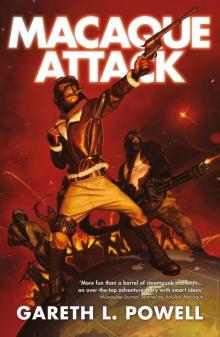 Macaque Attack!
Macaque Attack!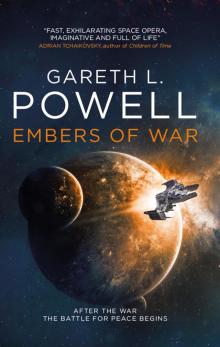 Embers of War
Embers of War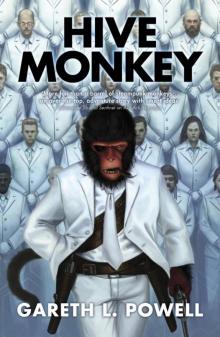 Hive Monkey
Hive Monkey